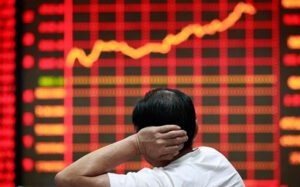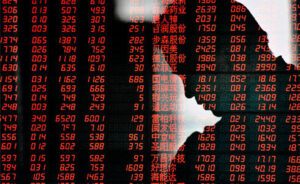
Most Asian stock indices are falling on Friday following similar dynamics in the US stock market a day earlier.
Investors are concerned that the Federal Reserve will continue aggressive tightening of monetary policy for the foreseeable future due to persistently high inflation, which could negatively affect the US economy.
Traders are waiting for the Fed to raise its base interest rate to 5% per annum next year. Last week, prior to the publication of fresh data on inflation in the US, they assumed a rise to 4.6%, according to futures on the size of the rate.
Consumer prices in Japan rose 3% in September from the same month a year earlier, the country’s Ministry of Interior and Communications said on Friday. Similar rates of increase were recorded in August. They are the highest since September 2014, while the rise in prices was noted for the thirteenth month in a row.
Consumer prices excluding fresh food, a key indicator monitored by the Bank of Japan, rose 3% year-on-year last month after rising 2.8% in August. The indicator exceeded the central bank’s 2% target for the sixth month in a row. At the same time, growth rates were the highest since September 2014.
The value of the Japanese index Nikkei 225 to 8:17 KSK fell by 0.4%.
Including the shares of such large companies as Fast Retailing (-0.9%), Toyota Motor (-0.4%) and Sony Group (-0.8%) become cheaper.
China’s Shanghai Composite rose 0.3% by 8:22 am KST, while Hong Kong’s Hang Seng shed 0.5%.
Shares of Shenzhou International Group Holdings Ltd., which is engaged in the production and sale of knitwear, are the leaders of the decline in quotations on the Hong Kong Stock Exchange. They fell in price by 6.3%.
In addition, the value of Budweiser Brewing Co. APAC (-3.7%), Chow Tai Fook Jewelery Group (-3.4%), sporting goods manufacturer Li Ning Co. (-3.4%).
Casino operator Sands China reported an 11.6% increase in net loss in the third quarter due to anti-coronavirus restrictions in Macau. The company’s shares lose 3.2% in price.
Meanwhile, stock quotes of online retailers Alibaba Group and JD.com Inc. rise respectively by 0.4% and 1.4%, the Internet giant Tencent Holdings Ltd. – by 0.9%.
The South Korean Kospi index decreased by 0.35% by 8:17 am KSK.
Quotes of securities of one of the world’s largest manufacturers of chips and electronics Samsung Electronics Co. rise by 0.9%, while the cost of automaker Hyundai Motor fell by 1.2%.
Share price of Samsung SDI Co. soared 5.9% on the news that the company has completed the construction of an enterprise for the production of components for the production of car batteries. It is expected that production on it will begin in the first quarter of 2023.
The Australian S&P/ASX 200 fell 0.8%. According to the results of the whole last week, it lost more than 1%.
Capitalization of the world’s largest mining companies BHP and Rio Tinto decreased on Friday by 0.7% and 0.8% respectively.
In addition, the shares of all four largest banks in the country fell in price: Commonwealth Bank – by 1.5%, ANZ Bank – by 1.1%, Westpac Banking – by 0.8% and National Australia Bank – by 1.5%.

Stock indices of the largest countries in the Asia-Pacific region (APR) are mainly falling during trading on Thursday, the only exception is the Shanghai indicator, which shows a weak positive trend.
Hong Kong’s Hang Seng Index fell 1.5% by 8:15 a.m. China’s Shanghai Composite added 0.2%.
Shares of biopharmaceutical company Wuxi Biologics (Cayman) Inc. are traded among the drop leaders in Hong Kong. (-8.4%), Internet companies Baidu Inc. (SPB: BIDU) (-7.5%) and video game developer Netease Inc. (SPB: NTES) (-5%).
Papers of casino operator Sands China (SPB: 1928) Ltd. cheaper by 1% after the release of quarterly reports. The company increased its net loss in the third quarter due to continued covid restrictions in Macau.
Shares of sports equipment manufacturer Li Ning Co. lose 4% in value despite the fact that the company reported solid sales growth in the third quarter. Analysts note that Li Ning’s Q4 outlook is rather weak due to anti-coronavirus restrictions.
Meanwhile, the People’s Bank of China (PBOC, the country’s central bank) on Thursday kept its base interest rate on loans (LPR) for a period of one year at 3.65% per annum. And the rate on five-year loans was left at 4.3% per annum, the NBK said in a statement.
The value of the Japanese Nikkei 225 index fell by 1%.
The leading decline among the components of the index are the shares of the manufacturer of electric cables Fujikura Ltd. (-5.4%), manufacturer of diagnostic medical equipment Hoya Corp. (-3.2%) and sanitary ware manufacturer Toto Ltd. (-3%).
Market capitalization of Shinsei Bank Ltd. jumped by 7.6%. The Japanese media reported that the “parent” company of the bank – SBI Holdings Inc. is considering delisting its shares from the stock exchange.
The volume of Japanese exports in September increased by 28.9% compared to the same month last year and reached 8.819 trillion yen (about $59 billion), data from the Ministry of Finance of the country showed. Imports soared 45.9% last month to a record 10.913 trillion yen. Japan’s foreign trade deficit reached 2.094 trillion yen in September compared to 636.9 billion yen a year earlier. Thus, the negative balance of the foreign trade balance is recorded for the 14th month – the longest such period since 2015.
South Korean index Kospi fell by 0.7%.
The market value of the largest automakers in the country Kia Corp. and Hyundai Motor are down 1.2% and 0.3% respectively.
The Australian S&P/ASX 200 fell 1%.
Shares of the world’s largest mining companies BHP Group and Rio Tinto fell 2.3% and 1.9%, respectively.
Oil and gas producers Woodside Energy and Santos jumped 6.2% and 2% on third-quarter output growth.
The unemployment rate in Australia in September remained unchanged compared to August and amounted to 3.5%, according to the country’s statistical office. Analysts also did not expect a change, writes Trading Economics. The number of employed last month increased by only 900 people.

Most of the stock indices of the largest Asian countries are falling on Wednesday.
Markets continue to be negatively affected by the threat of a recession in the global economy against the backdrop of persistently high inflation and tightening of monetary policy by major central banks, writes MarketWatch.
The International Monetary Fund on the eve worsened its forecast for global economic growth next year to 2.7% compared to 2.9% expected in July. At the same time, it is noted that the risks of a recession are especially high for Europe due to a sharp increase in energy prices.
China’s Shanghai Composite index fell 1.1% by 8:32 a.m. The Hong Kong Hang Seng shed 2.1%, falling for the fifth consecutive trading and is at its lowest level in the last 11 years.
Among the leaders of the decline in quotations on the Hong Kong Stock Exchange are securities of the owner of the restaurant chain Haidilao International Holding Ltd. (-7%), Budweiser Brewing Co. APAC Ltd. (-5.9%), casino operator Sands China Ltd. (-5.7%), developer Country Garden Holdings Co. (-5.6%).
Shares of Internet retailers Alibaba Group and JD.com fell 4.5% and 1.1%, respectively, while Internet giant Tencent Holdings Ltd. – by 2.2%, automakers Geely and BYD – by 3.1% and 0.5% respectively.
Among the components of Hang Seng, only three companies show an increase in value: insurer AIA (+0.7%), aluminum producer China Hongqiao Group Ltd. (+0.2%) and pharmaceutical CSPC Pharmaceutical Group Ltd. (+0.1%). Share price of China Mobile Ltd. is at the close of the previous day.
The value of the Japanese Nikkei 225 fell by 0.06% by 8:27 Moscow time.
The volume of orders for basic manufacturing equipment in Japan, an indicator of capital expenditure for the next 3-6 months, fell 5.8% in August compared to the previous month, the country’s cabinet said in a statement. This was the worst result in the last six months. Analysts, on average, had expected a contraction of just 2.3%, according to Trading Economics.
The leaders of the decline in quotations are papers of Tokyo Electron Ltd. (-4%), Pacific Metals Co. (-3.5%) and Mitsubishi Motors Corp. (-3.5%).
Meanwhile, the value of retailers Seven & I Holdings Co. is rising. (+3.7%) and Aeon Co. (+3.5%), as well as railway operators West Japan Railway Co. (+2.8%) and Central Japan Railway Co. (+2.5%).
The Australian S&P/ASX 200 fell 1.5%.
The capitalization of the world’s largest mining companies BHP and Rio Tinto fell by 1% and 1.9%, respectively
Meanwhile, the South Korean Kospi index increased by 0.35% by 8:27 Moscow time.
Quotes of securities of one of the world’s largest manufacturers of chips and electronics Samsung Electronics Co. rise by 0.9%, while the cost of automaker Hyundai Motor fell by 0.3%.
The Bank of Korea on Wednesday raised the base interest rate by 0.5 percentage points – up to 3% per annum, which coincided with the expectations of experts. The cost of lending has been increased for the eighth time since August 2021.
The Central Bank predicts that inflation in the country will peak in October, but will remain quite high in the near future – more than 5%, at least until the end of the first quarter of 2023. South Korea’s GDP is expected to increase by 2.6% in 2022, and by 2.1% next year.